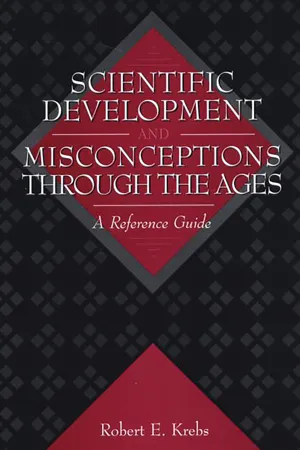Technology & Engineering
Archimedes
Archimedes was a Greek mathematician, physicist, engineer, inventor, and astronomer who lived in the 3rd century BC. He is known for his contributions to mathematics, including the principle of buoyancy and the concept of the lever, which are still used in engineering today.
Written by Perlego with AI-assistance
Related key terms
1 of 5
3 Key excerpts on "Archimedes"
- eBook - ePub
- Heath, Thomas Little, Sir(Authors)
- 2011(Publication Date)
- Perlego(Publisher)
PIONEERS OF PROGRESS MEN OF SCIENCE Edited by S. CHAPMAN, M.A., D.Sc., F.R.S. Archimedes BYSir THOMAS HEATH K.C.B., K.C.V.O., F.R.S.; Sc.D., Camb. Hon. D.Sc., OxfordΔός μοι ποῦ στῶ, καὶ κινῶ τὴν γῆνLONDON: SOCIETY FOR PROMOTING CHRISTIAN KNOWLEDGE NEW YORK: THE MACMILLAN CO. 1920CONTENTS.
CHAPTER I. Archimedes.CHAP. PAGE I. Archimedes 1 II. Greek Geometry to Archimedes 7 III. The Works of Archimedes 24 IV. Geometry in Archimedes 29 V. The Sandreckoner 45 VI. Mechanics 50 VII. Hydrostatics 53 Bibliography 57 Chronology 58 If the ordinary person were asked to say off-hand what he knew of Archimedes, he would probably, at the most, be able to quote one or other of the well-known stories about him: how, after discovering the solution of some problem in the bath, he was so overjoyed that he ran naked to his house, shouting εὕρηκα, εὕρηκα (or, as we might say, “I’ve got it, I’ve got it”); or how he said “Give me a place to stand on and I will move the earth”; or again how he was killed, at the capture of Syracuse in the Second Punic War, by a Roman soldier who resented being told to get away from a diagram drawn on the ground which he was studying.And it is to be feared that few who are not experts in the history of mathematics have any acquaintance with the details of the original discoveries in mathematics of the greatest mathematician of antiquity, perhaps the greatest mathematical genius that the world has ever seen.History and tradition know Archimedes almost exclusively as the inventor of a number of ingenious mechanical appliances, things which naturally appeal more to the popular imagination than the subtleties of pure mathematics.Almost all that is told of Archimedes reaches us through the accounts by Polybius and Plutarch of the siege of Syracuse by Marcellus. He perished in the sack of that city in 212 B.C. , and, as he was then an old man (perhaps 75 years old), he must have been born about 287 B.C. He was the son of Phidias, an astronomer, and was a friend and kinsman of King Hieron of Syracuse and his son Gelon. He spent some time at Alexandria studying with the successors of Euclid (Euclid who flourished about 300 B.C. - eBook - PDF
Scientific Development and Misconceptions Through the Ages
A Reference Guide
- Robert E. Krebs(Author)
- 1999(Publication Date)
- Greenwood(Publisher)
Archimedes spent much time figuring out the ratio of a circle's circumference to its diameter (pi or Jt) by "squaring the circle." His figure of 3.142 for Jt was very close. He developed war machines based on his knowledge of levers, pulleys, and optics to throw stones and concentrate the sun's rays to cause fires in the defense of his native Syracuse against the Romans. In a few years, Rome completed the invasion, and Archimedes was killed by a Roman soldier when he neglected to hear or respond to the soldier's order. He also contributed to the development of the concept of buoyancy. The story of Archimedes and his discovery of specific gravity is well known, but it can be told again as an example of a revelation of a scientific concept to a person with an inquiring mind. A king named Hiero ordered a crown of solid gold to be made. He suspected the contractor cheated him by substituting some silver for the gold but could not determine the crown's exact content. He asked Archimedes to investigate the situation. While pon- dering a solution Archimedes lowered himself into a full bath; when the water ran over the sides, he noticed that the lower he went down into the tub, the more water spilled over. He immediately found the solution to the problem. As it is reported, he ran down the street shouting "Eureka! Eureka!" ("I have found it! I have found it!") He then made a mass of silver and one of gold, each the same weight as the crown. Then he filled a pan to the brim with water and lowered the lump of silver into the pan, collecting the spilled water, and did the same for the lump of gold. He then measured the volume of the overflow water for each. The smaller amount of spilled water was caused by the gold, since it is more dense and thus less in volume than the identical weight of the silver lump. - eBook - PDF
Fluid-Structure Interaction
Numerical Simulation Techniques for Naval Applications
- Jean-François Sigrist, Cédric Leblond, Cedric Leblond(Authors)
- 2022(Publication Date)
- Wiley-ISTE(Publisher)
Today, it has resulted in the “virtual test basin”. 1.1. The emergence of a new science From the 4th century BCE, Aristotle attempted to provide philosophical definitions of movement and liquids, but it is to Archimedes, a century later, that we owe the first scientific manuscripts on fluid mechanics. His famous principle on the A Brief History of Naval Hydrodynamics 3 equilibrium of floating bodies still forms the basis of naval architecture. We also owe to him the invention of the screw, the rotation of which in fluid makes it possible to imprint an axial movement on this fluid. It was only 2,000 years later, in 1768, that the French mathematician Paucton gave a mathematical description of this, from which he deduced a theory of propeller propulsion. Archimedes’ principle and the concept of pressure linked to it was analyzed by the mathematician Flamand Stevin, to whom we owe the term hydrostatics. Then, in the middle of the 17th century, Blaise Pascal provided the expression of pressure within a fluid at rest, known as Pascal’s law. Two physicists, one Dutch, Christiaan Huygens, and the other French, Edme Mariotte, members of the entirely new Académie des sciences (Figure 1.3), sought to determine the law of a projectile’s resistance in a fluid and determined experimentally that this resistance varies as the square of the velocity of the body. Figure 1.3. Colbert presents the members of the Académie royale des sciences created in 1667 to Louis XIV, Henri Testelin (1616–1695), oil on canvas (1666), and château de Versailles (detail). In the center, Huygens and Mariotte (source: RMN- Grand Palais, château de Versailles/Gérard Blot). For a color version of this figure, see www.iste.co.uk/sigrist/fluidstructure.zip 4 Fluid–Structure Interaction In Principia Mathematica, published in 1687, Newton demonstrated this result using a particular – erroneous! – model of fluid in the form of collisions of minuscule solid spheres that strike the body.
Index pages curate the most relevant extracts from our library of academic textbooks. They’ve been created using an in-house natural language model (NLM), each adding context and meaning to key research topics.


